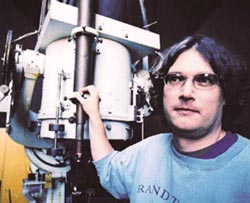Peter H. Hauschildt
 Lamar Dodd Award 2002
Lamar Dodd Award 2002
Peter H. Hauschildt, Associate Professor of Physics and Astronomy, is recognized by top astronomers as “the world leader, genuinely peerless,” in the development of the computational modeling of stellar atmospheres. With the development of his PHOENIX computer code, Dr. Hauschildt is able to solve problems that have an immense impact on the field of astrophysics.
Outside of our solar system, all our knowledge concerning astronomical objects and processes is based on observed electromagnetic energy emitted as light. However, the interior atmospheres and stellar cores of these bodies are hidden from view and cannot be observed directly. To understand the inner workings of a star and its evolution over time from such limited information is an enormous challenge. It requires building detailed and complex theoretical models, a feat that has eluded even the field’s most prominent scientists.
“This work presents such daunting computational and conceptual challenges that I had personally considered it to be impossible, at least within my lifetime,” said Dr. Dimitri Mihalas of the Los Alamos National Laboratory.
Using complex computer simulations, Dr. Hauschildt’s research group has met the challenge by constructing numerical models of stellar atmospheres. Their PHOENIX computer code is noted for its degree of realism and unparalleled value in interpreting spectroscopic observations. PHOENIX is applied to a broad range of astrophysical problems, thereby advancing the field as a whole.
Since joining UGA in 1996, Dr. Hauschildt has quickly gained recognition for the depth and breadth of his work. A prolific writer, he has 104 articles to his credit, 71 within the past five years. “Everything that Peter has published is so important that it is very hard to single out one contribution,” Dr. Mihalas adds. Dr. Hauschildt’s funding record is as remarkable as the magnitude of his research. In the past five years, he has generated almost $1.5 million from sources such as National Science Foundation and NASA, an excellent, highly unusual record in the realm of theory and computation.

 Lamar Dodd Award 2002
Lamar Dodd Award 2002